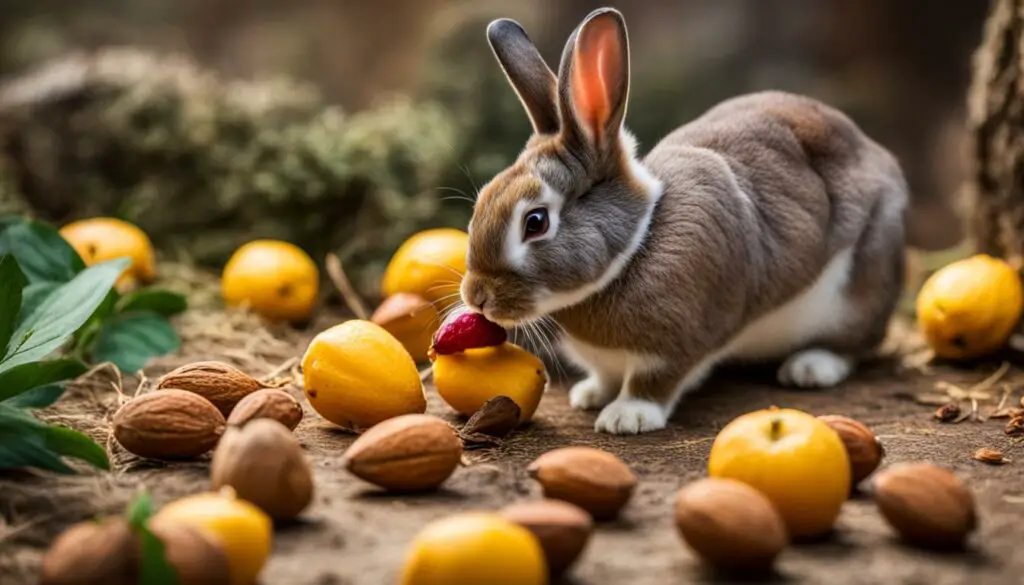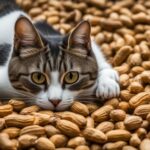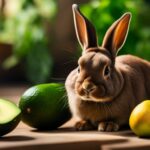As a responsible rabbit owner, it’s important to know what foods are safe and healthy for your furry friend. One common question that often arises is whether rabbits can eat almonds. To answer this question, let’s explore the nutty facts about rabbit diets.
Key Takeaways:
- Nuts, including almonds, are high in fats and carbohydrates, which can be harmful to rabbits.
- Rabbits rely on high-fiber and low-calorie foods, such as hay, for their nutritional needs.
- Excessive fat and calorie intake can lead to obesity and health complications in rabbits.
- While nuts are considered safe for rabbits in very tiny amounts, it is best to avoid feeding them altogether to prevent digestive issues.
- Rabbits need a diet high in fiber, and nuts provide little nutritional benefit compared to their high fat and calorie content.
Nutrients in Nuts and Comparison with Hay
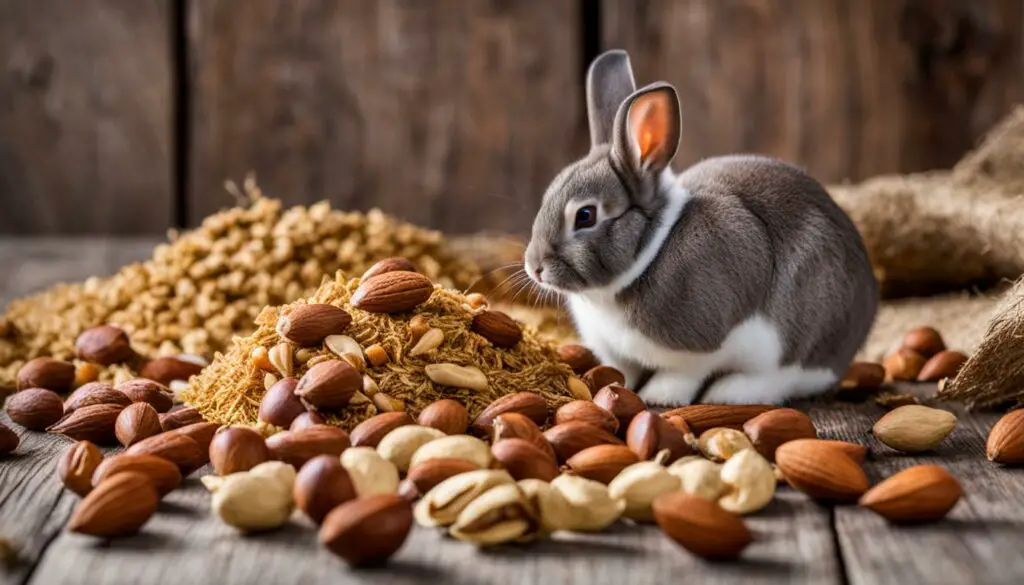
Nuts, including almonds, are nutrient-dense and contain vitamins and minerals such as calcium, vitamin E, folate, and potassium. However, when compared to hay, which is a staple in a rabbit’s diet, nuts are high in fat, carbohydrates, and calories. Hay, on the other hand, is dense in fiber, low in carbohydrates, fat, and calories. Rabbits require a significant amount of hay in their diet to ensure proper digestion and maintain a healthy weight. The fiber in hay provides satiety and supports the movement of food through the gastrointestinal tract. Nuts, due to their high nutrient density, can lead to obesity issues in rabbits and increase the risk of heart disease.
Nutrients in Nuts:
| Nutrient | Almonds | Hay |
|---|---|---|
| Calcium | 4mg | 22mg |
| Vitamin E | 5.3mg | 0.6mg |
| Folate | 4mcg | 7mcg |
| Potassium | 208mg | 92mg |
As shown in the table above, while nuts like almonds do contain certain nutrients, the amounts are significantly lower compared to hay. Hay provides rabbits with essential fiber that aids in digestion and helps maintain a healthy weight. Additionally, the high fat and calorie content in nuts can potentially lead to weight gain and health complications in rabbits. It is crucial to prioritize a rabbit’s dietary needs by focusing on hay and other low-calorie, high-fiber foods instead of nuts.
Effect of Nuts on a Rabbit’s Gut
Nuts, due to their high fat and carbohydrate content and low fiber, can have detrimental effects on a rabbit’s gut. The delicate balance of bacteria in a rabbit’s gut flora is crucial for proper digestion, and nuts can disrupt this balance. When rabbits consume nuts, it can lead to digestive issues such as bad bacteria overgrowth, gastrointestinal stasis, constipation, and the formation of soft stools. Without adequate fiber, a rabbit’s stomach and cecum cannot empty properly, resulting in the accumulation of fecal matter and disruption of gut flora.
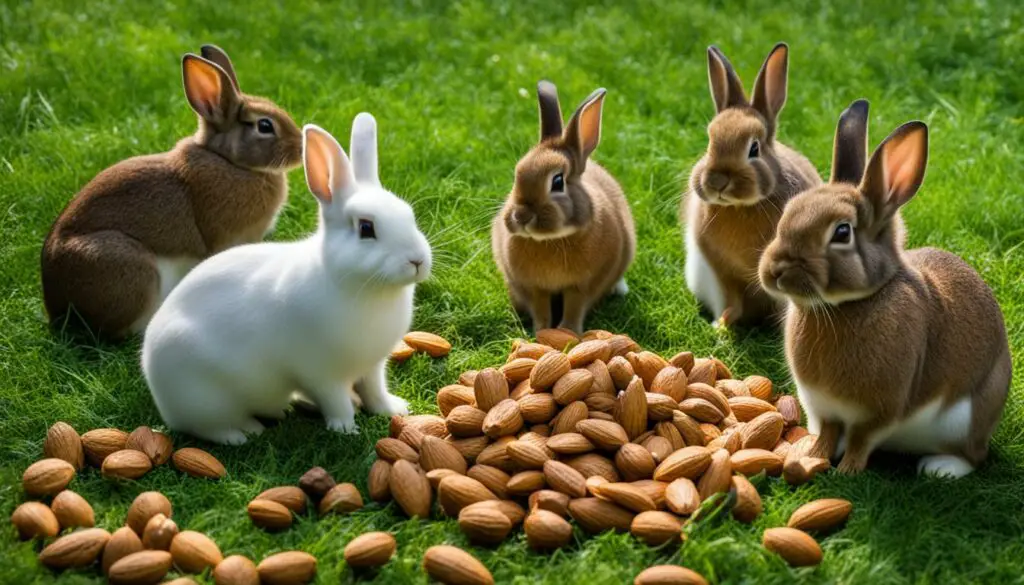
Furthermore, nuts can contribute to yeast overgrowth in a rabbit’s gut, which can release toxins that are harmful to rabbits. Rabbits have a specialized digestive system that requires a diet high in fiber to maintain proper gut function. Nuts, being low in fiber and high in fat and carbohydrates, do not provide the necessary nutrients that rabbits need. Instead, rabbits should primarily consume hay, fresh vegetables, and a controlled amount of pellets to ensure optimal gut health.
Impact of Nuts on Digestive Health
The consumption of nuts by rabbits can lead to various digestive health issues. The lack of fiber in nuts prevents proper digestion and can result in gastrointestinal stasis, a condition where the movement of food through the digestive system slows down or stops. This can lead to discomfort, pain, and bloating in rabbits. Additionally, the imbalanced gut flora caused by nuts can contribute to the growth of harmful bacteria, further exacerbating digestive problems.
Hazards of Nut Consumption in Rabbits
When it comes to feeding nuts to rabbits, there are several hazards and health complications that owners should be aware of. Nut consumption, including almonds, can lead to various issues that can negatively impact a rabbit’s well-being.
One major concern is the high fat content in nuts, which can contribute to obesity and weight gain in rabbits. Excessive fat intake can lead to bloating, stomach pain, and other digestive problems. Additionally, certain vitamins and minerals found in nuts, such as folic acid, vitamin A, and calcium, can have negative effects on a rabbit’s nervous system, joints, and overall health when consumed in excessive amounts.
Another hazard of nut consumption in rabbits is the potential imbalance of nutrients. While nuts contain certain nutrients, their overall composition may not meet the specific dietary needs of rabbits. Rabbits require a diet high in fiber, and nuts provide little nutritional benefit compared to their high fat and calorie content. This can result in nutrient imbalances and deficiencies that can affect a rabbit’s overall health and well-being.
The Hazards of Nut Consumption in Rabbits
| Hazard | Description |
|---|---|
| Obesity | Excessive fat intake can lead to obesity and weight gain in rabbits. |
| Digestive problems | Nuts can cause bloating, stomach pain, and other digestive issues in rabbits. |
| Nutrient imbalances | The overall composition of nuts may not meet a rabbit’s specific dietary needs, leading to nutrient imbalances and deficiencies. |
| Negative effects on health | Certain vitamins and minerals found in nuts, when consumed in excessive amounts, can have negative effects on a rabbit’s nervous system, joints, and overall health. |
Considering these hazards, it is best to avoid feeding nuts, including almonds, to rabbits. Instead, rabbits should primarily consume a diet high in fiber, consisting of hay, fresh vegetables, and a controlled amount of pellets. These foods provide the necessary nutrients for a rabbit’s well-being and digestive health without the potential risks associated with nut consumption.
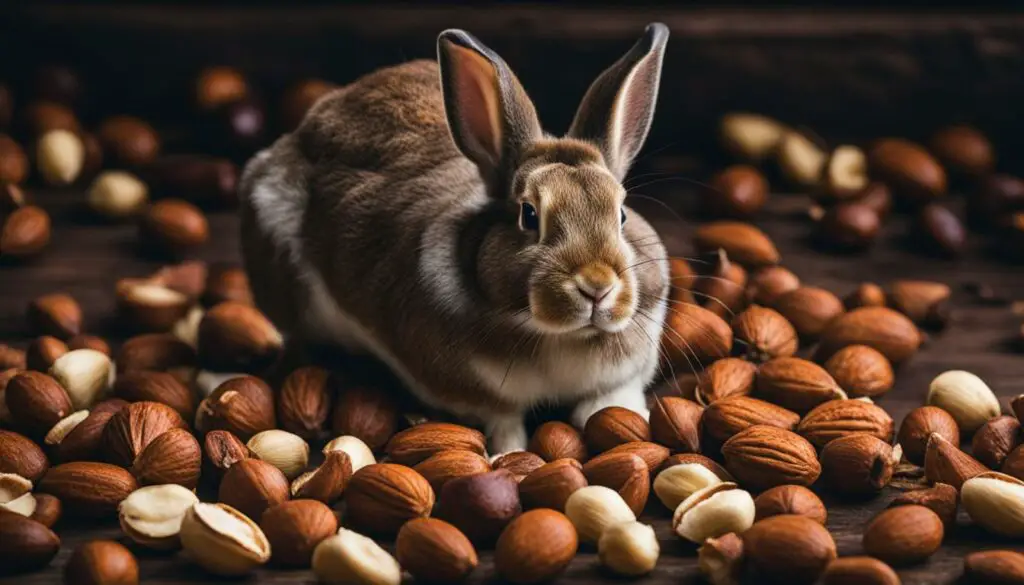
By prioritizing a rabbit’s dietary needs and avoiding potentially harmful foods, owners can ensure their pet’s optimal health and well-being. It is essential to provide rabbits with a balanced and appropriate diet to support their specific nutritional requirements and prevent health complications related to nut consumption.
Rabbit Dietary Considerations and the Importance of a High-Fiber Diet
When it comes to the dietary needs of rabbits, there are several important considerations to keep in mind. Rabbits are strict herbivores and have evolved to thrive on a high-fiber and low-energy diet. Their digestive systems are designed to process plant-based foods, with hay being a staple in their daily nutrition. Hay provides the necessary fiber for healthy digestion and helps prevent gastrointestinal issues such as stasis and bloating.
H3: The Role of Hay as a Staple Food
Hay should comprise 80 to 90% of a rabbit’s diet, with fresh hay available at all times. It is an essential source of fiber, which promotes satiety, supports proper gut flora, and ensures the smooth movement of food through the digestive tract. In addition to hay, rabbits can also be offered a variety of fresh vegetables, leafy greens, and a controlled amount of pellets as part of a balanced diet. However, it’s crucial to avoid feeding them foods that are high in fat, carbohydrates, and low in fiber, such as nuts.

H3: The Risks of Nut Consumption
Nuts, including almonds, are not recommended for rabbits due to their high fat and calorie content. While nuts can provide some nutrients, they offer little nutritional benefit compared to their potential risks. Feeding rabbits nuts can lead to obesity, digestive issues, and imbalances in gut flora. Additionally, some nuts may contain substances that are toxic to rabbits in large quantities. It’s best to prioritize a rabbit’s health by providing them with a diet that consists of safe and appropriate foods, focusing on the high-fiber content that hay provides.
H3: The Importance of a High-Fiber Diet
A high-fiber diet is crucial for maintaining a rabbit’s digestive health and overall well-being. Fiber helps prevent obesity, supports regular bowel movements, and reduces the risk of gastrointestinal complications. By prioritizing a diet rich in fiber and avoiding foods like nuts that can disrupt a rabbit’s digestive system, owners can ensure their pets’ optimal health and longevity.
| Foods to prioritize for a rabbit’s diet | Foods to avoid in a rabbit’s diet |
|---|---|
|
|
Peanut Butter and Rabbits
Peanut butter is not recommended for rabbits. While it may not be immediately toxic, peanut butter is difficult for rabbits to digest due to its high fat and protein content. Rabbits have sensitive digestive systems that require a high-fiber and low-fat diet. Peanut butter can cause obesity, bloating, liver and kidney issues, and in extreme cases, heart failure in rabbits. Additionally, many varieties of peanut butter contain added sugars and salts, which are even more challenging for rabbits to metabolize. It is best to avoid offering peanut butter as a treat or snack for rabbits.
Dangers of Peanut Butter for Rabbits
Peanut butter poses several dangers to rabbits due to its high fat and protein content. Here are some reasons why you should avoid feeding peanut butter to rabbits:
- Difficulty in digestion: Rabbits have sensitive digestive systems that are adapted to a high-fiber diet. Peanut butter is high in fat and protein, which can be challenging for rabbits to digest properly.
- Obesity and weight gain: The high fat content in peanut butter can contribute to obesity and weight gain in rabbits. As herbivores, rabbits require a diet low in fat to maintain a healthy body weight.
- Kidney and liver issues: Excessive consumption of fat and protein can strain a rabbit’s kidneys and liver, potentially leading to health complications.
- Potential heart failure: The high fat content in peanut butter can increase the risk of heart disease in rabbits, leading to heart failure in extreme cases.
Given these risks, it is best to avoid offering peanut butter to rabbits and choose healthier alternatives for their snacks and treats.
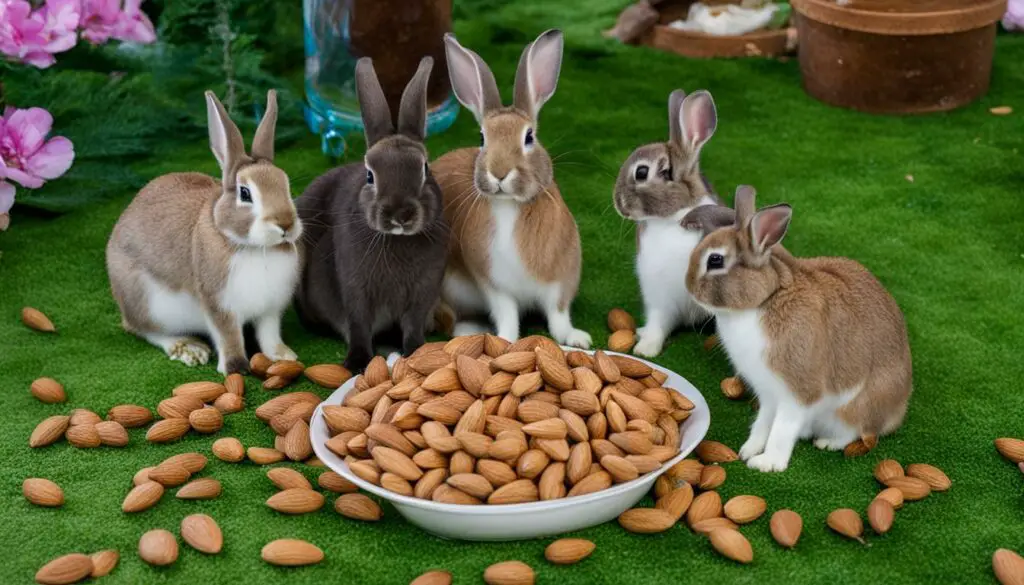
Alternatives to Peanut Butter for Rabbits
Instead of peanut butter, there are many safe and healthy snack options for rabbits. Here are some alternatives to consider:
- Fresh vegetables: Offer a variety of fresh vegetables such as carrots, bell peppers, and leafy greens. These provide essential nutrients and are low in fat.
- Herbs: Basil, parsley, and cilantro are tasty and nutritious options for rabbits. These herbs can be offered in small quantities as a flavorful treat.
- Hay-based treats: Look for hay-based treats specifically made for rabbits. These treats are designed to meet their dietary needs and provide a healthy snack option.
It is important to prioritize a rabbit’s health and well-being by providing them with a diet that aligns with their natural nutritional requirements. By avoiding peanut butter and opting for safer alternatives, you can ensure that your rabbit stays happy and healthy.
Other Nuts to Avoid Feeding Rabbits
When it comes to feeding rabbits, it’s important to be mindful of the foods that can be harmful to their health. Besides almonds and peanuts, there are several other nuts that should be avoided in a rabbit’s diet. These nuts include cashews, hazelnuts, pine nuts, pecans, and Brazil nuts. While these nuts may have nutritional value for humans, they can pose risks to rabbits.
Nuts are high in fats and proteins, which can lead to weight gain and digestive issues in rabbits. Additionally, certain nuts, such as Brazil nuts, can contain substances like selenium, which can be toxic to rabbits in large quantities. It’s crucial to prioritize a rabbit’s dietary needs and avoid feeding them nuts, as there are safer and more appropriate food options available to meet their nutritional requirements.
If you’re looking for healthy snacks for your rabbit, there are plenty of alternatives to nuts. Rabbits can enjoy a variety of fresh vegetables and herbs, such as basil, dill, cucumbers, romaine lettuce, dandelions, clover, zucchini, and pumpkin. These foods provide a mix of vitamins, minerals, and fiber that support a rabbit’s overall health. However, it’s important to remember that these fresh foods should be given in moderation, with hay being the primary source of nutrition for rabbits.
| Nuts to Avoid Feeding Rabbits: |
|---|
| – Almonds |
| – Peanuts |
| – Cashews |
| – Hazelnuts |
| – Pine nuts |
| – Pecans |
| – Brazil nuts |
The Dangers of Brazil Nuts
When it comes to the dietary considerations for rabbits, Brazil nuts are best avoided. These nuts are high in fat and can lead to obesity, gastrointestinal stasis, liver disease, and atherosclerosis in rabbits. The high fat content can significantly impact a rabbit’s overall health and well-being. Additionally, Brazil nuts contain selenium, which can be toxic to rabbits when consumed in large quantities. Rabbits require a diet that is low in fat and carefully balanced to meet their nutritional needs, and feeding them Brazil nuts can disrupt this balance and lead to various health issues.
It is crucial to prioritize a rabbit’s digestive health and overall well-being by avoiding the consumption of Brazil nuts. These nuts provide little nutritional benefit to rabbits and can pose significant risks to their health. Instead, it is recommended to focus on providing rabbits with a diet that consists of safe and appropriate foods that meet their specific dietary requirements.
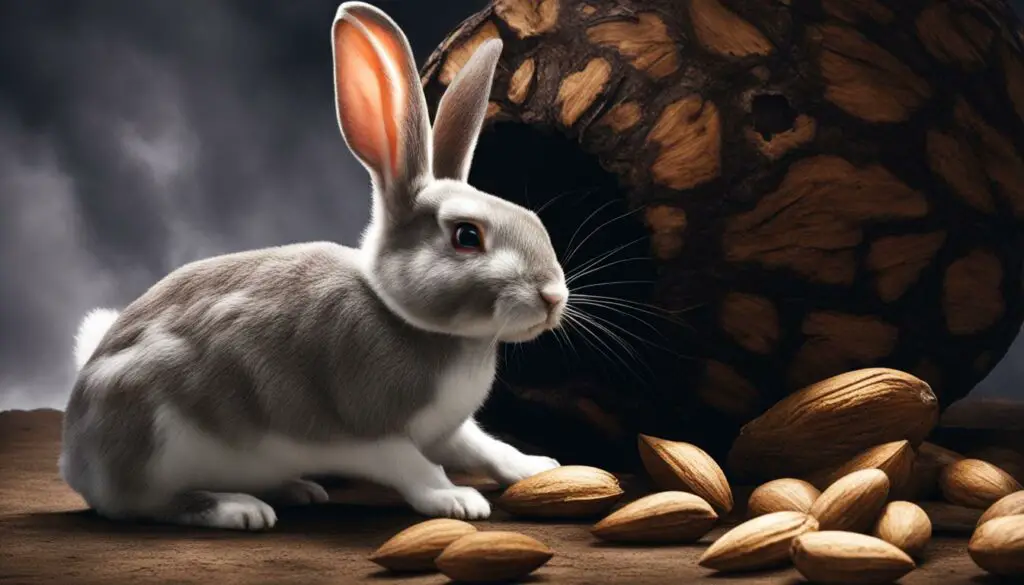
Wild Rabbits and Nut Consumption
The natural diet of wild rabbits does not include nuts. In the wild, rabbits primarily consume grasses, herbs, and leafy greens to meet their nutritional needs. Nuts, including almonds, are not part of their natural diet and should not be fed to wild rabbits. The digestive systems of wild rabbits are adapted to process plant-based foods high in fiber, and nuts can disrupt their delicate digestive balance. It is important to avoid leaving nuts or any other potentially harmful foods where wild rabbits can access them to protect their health and well-being.
Unlike domesticated rabbits, which have specific dietary requirements that can be met through a controlled diet, wild rabbits rely solely on their natural environment for food. Feeding them nuts or other processed foods like seeds can introduce substances that are harmful or not ideal for their digestive systems. Wild rabbits are best suited to consume the plant-based foods that they are evolutionarily adapted to, ensuring their optimal health and natural feeding habits.
By understanding the natural diet of wild rabbits and respecting their dietary requirements, we can help preserve their well-being in their natural habitats. Avoiding the feeding of nuts and other inappropriate foods to wild rabbits is crucial in maintaining their digestive health and overall survival.
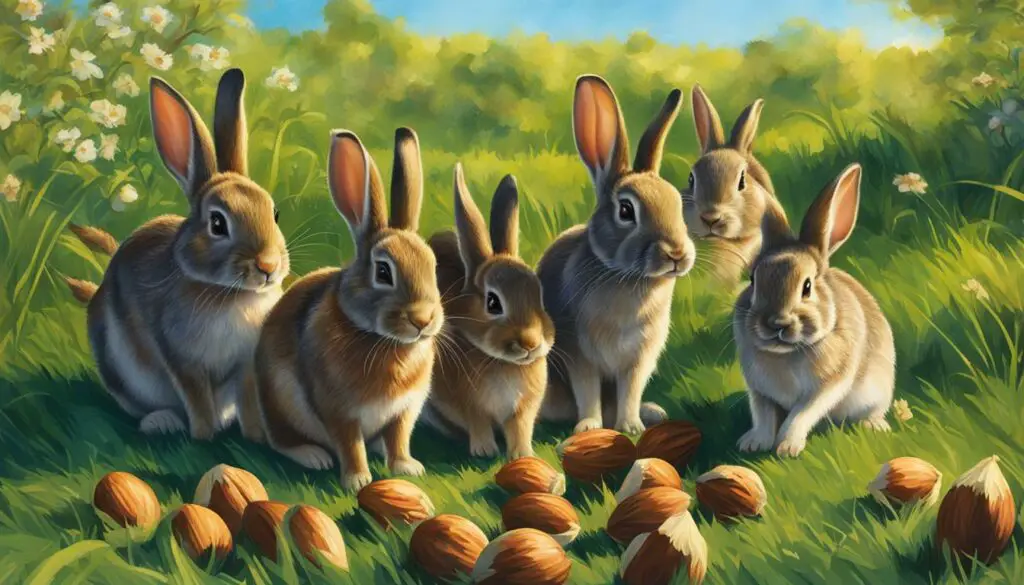
| Wild Rabbits | Nuts |
|---|---|
| Primarily consume grasses, herbs, and leafy greens | Not part of their natural diet |
| High-fiber diet | High-fat and low-fiber |
| Healthy digestive system | Disrupts gut flora |
| Well-adapted to their natural environment | Not suitable for their evolutionary needs |
Healthy Snacks for Rabbits
Rabbits can enjoy a variety of healthy snacks that provide them with essential nutrients and add variety to their diet. Here are some rabbit-friendly foods that make great treats:
- Basil: This aromatic herb is not only flavorful but also packed with vitamins and minerals that promote a rabbit’s overall health.
- Dill: Another herb that rabbits find irresistible, dill is a good source of antioxidants and can aid in digestion.
- Cucumbers: These hydrating vegetables are low in calories and high in water content, making them a refreshing and healthy snack for rabbits.
- Romaine lettuce: Unlike iceberg lettuce, romaine lettuce is safe for rabbits and provides them with essential nutrients like vitamin A and fiber.
- Dandelions: These common weeds are nutritious for rabbits and can be given in moderation as a treat. Just make sure they are free from pesticides.
- Clover: Rabbits love nibbling on clover, which contains vitamins, minerals, and phytochemicals that support their overall well-being.
- Zucchini: This versatile vegetable is low in calories and high in fiber, making it a great addition to a rabbit’s snack menu.
- Pumpkin: A small amount of pumpkin can be a tasty and nutritious treat for rabbits, as it is rich in vitamins and antioxidants.
Remember:
While these snacks provide a range of benefits for rabbits, it is important to offer them in moderation and as secondary to their main diet of hay. Hay should always be the primary source of nutrition for rabbits as it provides the necessary fiber they need for proper digestion and overall health.
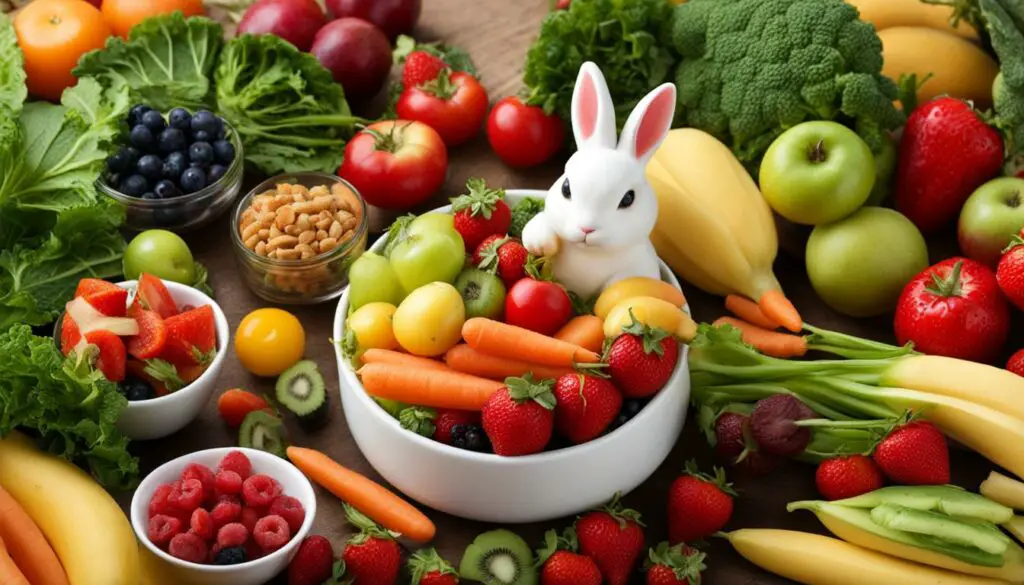
| Snack | Nutritional Benefits |
|---|---|
| Basil | Rich in vitamins and minerals |
| Dill | Supports digestion and adds flavor |
| Cucumbers | Hydrating and low in calories |
| Romaine lettuce | High in fiber and essential nutrients |
| Dandelions | Nutritious and safe when pesticide-free |
| Clover | Provides vitamins, minerals, and phytochemicals |
| Zucchini | Low-calorie and high in fiber |
| Pumpkin | Rich in vitamins and antioxidants |
By offering a variety of healthy snacks alongside their main diet, you can ensure that your rabbits receive a well-rounded and balanced nutrition. Remember to introduce new foods gradually and watch for any signs of digestive upset. With the right combination of treats and hay, your rabbits can enjoy a healthy and happy life!
Foods to Avoid Feeding Rabbits
When it comes to feeding rabbits, it is important to be aware of the foods that can be harmful or toxic to them. Certain foods may cause digestive issues, nutritional imbalances, or even pose serious health risks to rabbits. Here are some foods that should be avoided when feeding rabbits:
“Chocolate: Contains caffeine and theobromine, which are poisonous to rabbits.”
“Garlic: Toxic to many animals, including rabbits.”
“Iceberg lettuce: Contains harmful compounds that can cause adverse reactions in rabbits.”
“Almonds: High in fats and proteins, which rabbits cannot digest properly.”
It is essential to prioritize the health and well-being of rabbits by providing them with a diet that consists of safe and appropriate foods. Instead of offering these potentially harmful foods, rabbits can enjoy a variety of other healthy snacks and treats, such as fresh vegetables and herbs. By following proper dietary guidelines, you can ensure that your rabbits receive the nutrition they need without putting their health at risk.
It is important to note that this list is not exhaustive, and there may be other foods that can be harmful to rabbits. If you are unsure about the safety of a particular food, it is best to consult with a veterinarian or seek guidance from reputable rabbit care resources.
| Foods to Avoid Feeding Rabbits |
|---|
| Chocolate |
| Garlic |
| Iceberg Lettuce |
| Almonds |
Can Wild Rabbits Eat Seeds and Nuts?
When it comes to the natural diet of wild rabbits, seeds and nuts are not typically part of their regular food sources. In the wild, rabbits primarily rely on grasses, herbs, and leafy greens as their main source of nutrition. These plant-based foods provide the necessary fiber, vitamins, and minerals that wild rabbits need to thrive in their natural environment. While there may be exceptions, such as sunflower seeds, it is generally best to avoid planting seeds and nuts where wild rabbits can access them.
It is important to remember that wild rabbits have specific dietary requirements that have evolved over time. Their digestive systems are designed to process plant-based foods, not processed or high-fat foods like seeds and nuts. Introducing these types of foods into their diet can disrupt their delicate digestive balance and potentially cause health issues.
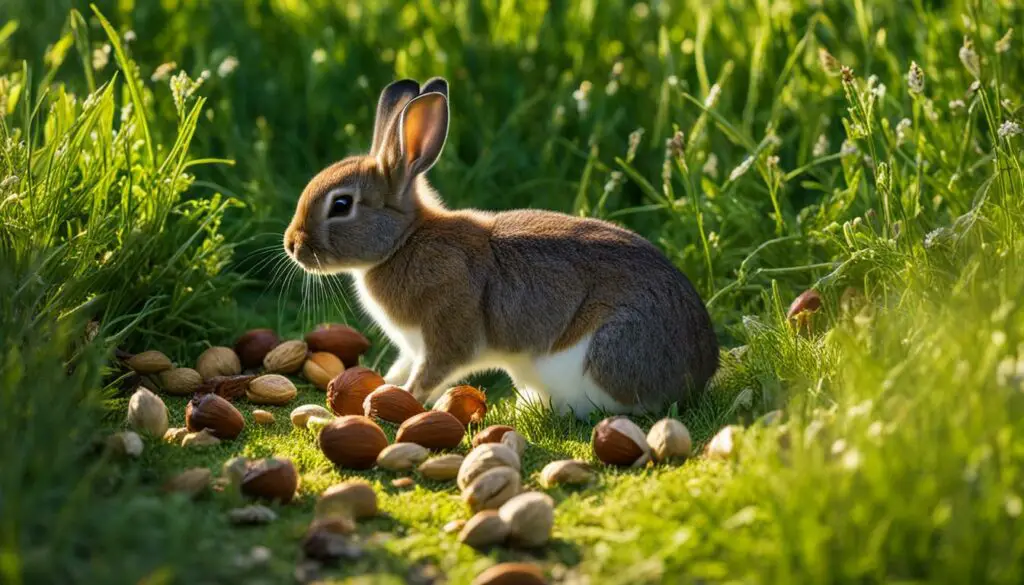
For the optimal health and well-being of wild rabbits, it is recommended to provide them with a diet that mimics their natural food sources. This means offering them a variety of fresh grasses, herbs, and leafy greens. By prioritizing their natural diet, we can ensure that wild rabbits receive the necessary nutrients while minimizing the risk of digestive complications and other health problems.
Benefits of a High-Fiber Diet for Rabbits
A high-fiber diet plays a crucial role in maintaining the digestive health of rabbits and promoting their overall well-being. Fiber is essential for rabbits because it supports regular bowel movements, helps prevent gastrointestinal issues such as stasis and bloating, and maintains proper gut flora. By prioritizing a diet rich in fiber, rabbit owners can ensure optimal digestive function and reduce the risk of various health complications.
Rabbits have evolved to process plant-based foods high in fiber, such as hay and leafy greens. These foods provide the necessary bulk to promote healthy digestion and prevent obesity. The fiber in a rabbit’s diet helps regulate the movement of food through their gastrointestinal tract, ensuring efficient digestion and the elimination of waste. This not only aids in preventing digestive problems but also helps rabbits maintain a healthy weight.
Furthermore, a high-fiber diet promotes a healthy balance of gut flora in rabbits. The beneficial bacteria in their digestive system rely on fiber as their primary food source. By consuming a diet rich in fiber, rabbits support the growth and proliferation of these beneficial bacteria, which play a vital role in nutrient absorption and overall gut health.
| Benefits of a High-Fiber Diet for Rabbits |
|---|
| Supports regular bowel movements |
| Prevents gastrointestinal issues like stasis and bloating |
| Maintains proper gut flora |
| Aids in weight management |
| Promotes efficient digestion and waste elimination |
| Enhances nutrient absorption |
Overall, a high-fiber diet is crucial for the digestive health and well-being of rabbits. By providing them with plenty of hay, leafy greens, and other fiber-rich foods, rabbit owners can ensure their pets lead happy and healthy lives.

Conclusion
In conclusion, it is not recommended to feed almonds or other nuts to rabbits. Rabbits have specific dietary needs that prioritize high-fiber and low-calorie foods such as hay, grasses, and leafy greens. Nuts, on the other hand, are high in fats and carbohydrates, which can lead to weight gain and digestive issues in rabbits. It is important to provide rabbits with a balanced diet that meets their nutritional requirements and avoids potentially harmful substances.
Rather than nuts, there are many healthy snack options for rabbits. Fresh vegetables and herbs such as basil, dill, cucumbers, romaine lettuce, dandelions, clover, zucchini, and pumpkin can be offered in moderation as treats. These foods provide a mix of vitamins, minerals, and fiber that support a rabbit’s overall health. However, it is essential to remember that hay should always be the primary source of nutrition for rabbits, supplemented with appropriate fresh foods.
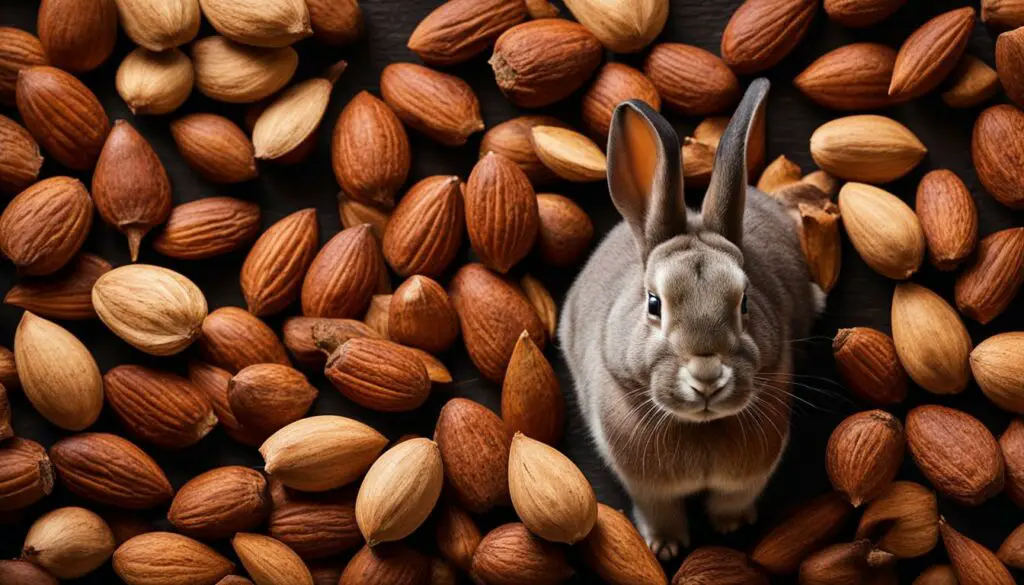
To summarize:
- Almonds and other nuts are not suitable for rabbit diets due to their high fat and carbohydrate content.
- Rabbits require a high-fiber and low-calorie diet consisting of hay, grasses, and leafy greens.
- Safe treats for rabbits include fresh vegetables and herbs, offered in moderation.
- It is important to prioritize a rabbit’s digestive health and overall well-being by providing them with a diet tailored to their specific needs.
Additional Resources
If you’re looking for more information on rabbit nutrition and diet guidelines, here are some resources to help you out:
1. Rabbit Nutrition Guide: This comprehensive guide provides detailed information on the ideal diet for rabbits, including the importance of high-fiber foods and safe treats.
2. Rabbit Diet Tips and Tricks: Learn practical tips and tricks for feeding your rabbit a healthy and balanced diet. This resource covers everything from portion control to introducing new foods.
3. Rabbit Nutrition: Common Questions Answered: Get answers to frequently asked questions about rabbit nutrition and find expert advice on meeting your rabbit’s dietary needs.
Remember, providing your rabbit with a well-balanced diet is essential for their overall health and well-being. These resources will help you make informed decisions and ensure your furry friend receives the nutrition they need.
FAQ
Can rabbits eat almonds?
No, almonds and other nuts are not recommended for rabbits’ diets. Nuts are high in fats and carbohydrates, which can lead to weight gain and digestive issues in rabbits. Rabbits have specific dietary needs that prioritize high-fiber and low-calorie foods, such as hay, grasses, and leafy greens.
Are nuts safe for rabbits?
While nuts are considered safe for rabbits in very tiny amounts, it is best to avoid feeding them altogether to prevent digestive issues and imbalances in gut flora. Rabbits need a diet high in fiber, and nuts provide little nutritional benefit compared to their high fat and calorie content.
What are the hazards of nut consumption in rabbits?
Nut consumption in rabbits can lead to health complications such as obesity, gastrointestinal stasis, constipation, and the formation of soft stools. Nuts can also disrupt the delicate balance of bacteria in a rabbit’s gut flora and contribute to yeast overgrowth and the release of toxins.
What foods should be avoided when feeding rabbits?
Besides nuts, foods such as chocolate, garlic, iceberg lettuce, and certain nuts like cashews, hazelnuts, pine nuts, pecans, and Brazil nuts should be avoided when feeding rabbits. These foods can be harmful or toxic to rabbits and can lead to various health issues.
What are some healthy snack options for rabbits?
Basil, dill, cucumbers, romaine lettuce, dandelions, clover, zucchini, and pumpkin are some of the nutritious foods that rabbits can enjoy in moderation. These foods provide a mix of vitamins, minerals, and fiber that support a rabbit’s overall health.
Can rabbits eat peanut butter?
No, peanut butter is not recommended for rabbits. It is difficult for them to digest due to its high fat and protein content. Peanut butter can cause obesity, bloating, liver and kidney issues, and in extreme cases, heart failure in rabbits.
What are the dangers of Brazil nuts for rabbits?
Brazil nuts, like other nuts, are high in fat and should not be fed to rabbits. The high fat content can lead to obesity, gastrointestinal stasis, liver disease, and atherosclerosis in rabbits. Additionally, Brazil nuts contain selenium, which can be toxic to rabbits in large quantities.
Can wild rabbits eat seeds and nuts?
No, wild rabbits do not naturally consume seeds and nuts as part of their diet. Their diet primarily consists of grasses, herbs, and leafy greens. It is important to avoid introducing potentially harmful substances into their environment.
What are the benefits of a high-fiber diet for rabbits?
A high-fiber diet is essential for rabbits’ digestive health and overall well-being. Fiber helps maintain proper gut flora, supports regular bowel movements, and prevents gastrointestinal issues such as stasis and bloating. By prioritizing a high-fiber diet, owners can ensure their pets’ optimal digestive function and long-term health.
Are there additional resources available on rabbit nutrition and diet?
For more information on rabbit nutrition and diet guidelines, you can refer to the following resources:

